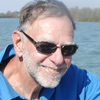A couple of weeks ago, my wife and I were descending from the Continental Divide in Colorado when, as my wife observed with a mixture of awe, concern and laughter, “You just vanished.” It wasn’t the first time I had vanished, and it won’t be the last.
We were spending a few days in what Coloradans smilingly call the Banana Belt, the Arkansas River Valley north of the San Luis Valley, where summers are cooler and winters warmer than in most of the rest of Colorado.
It had been a nearly perfect trip, until I vanished. Driving through Salida, we stumbled on an annual festival focused on rafting on the river that runs right though the center of town and is perhaps the best whitewater in the country after the Colorado, Green and Snake rivers.
We have been quite taken with Salida on several visits there, a town of only about 5,000 which still manages to support a daily newspaper, a hospital, a community college, a couple of wineries and even a small writer's colony (including two major national writers).
In a large park on the riverbank bands played rock and blues, and vendors sold food, beer and wine. The old 19th-century downtown seems to be thriving. Although most of the chain motels and fast-food restaurants had snuggled up to the new Walmart on the highway that bypasses downtown, the center of town still sports an eclectic bunch of shops, galleries, a Safeway supermarket, bars and eateries, along with a youth hostel and, a block or so away, an elegantly restored all-suites hotel.
We camped our first night a few miles north of town at a site overlooking Brown’s Canyon where we could watch the variegated commercial and private craft running the rapids.
Early the next morning we headed 25 miles north to Buena Vista, the next town of any size in the valley, where we stopped for an espresso and homemade scone before heading west on graded dirt roads to the trailhead for Kroenke Lake. I felt as alert, alive and invigorated as it is possible for a 72-year-old to feel.
We slogged our way up a beautiful trail beside North Cottonwood Creek (a branch of a branch that carries more water than the Rio Grande through Albuquerque these days). Even with light, well-organized backpacks, I am getting old enough that carrying significant weight while climbing nearly 3,000 feet in 5 miles is, let us say, exercising.
After searching for and eventually finding the perfect campsite beside a pond of snow runoff beneath the evergreens with fourteeners towering all around us, we rested, lunched and then headed up the trail that circled the lake and climbed another thousand feet to the Continental Divide at nearly 13,000 feet.
Snow was still heavy in spots across the trail, sometimes a hundred yards or more across and several feet thick. Climbing to the divide, we exhausted ourselves circling around these patches, often losing the trail and walking two or three times as far as we would have had we just plunged straight ahead. The view from the divide is as spectacular as you might imagine, including several of the dozen fourteeners that rear their rocky summits in the surrounding Collegiate Peaks Wilderness.
Descending, we decided to save ourselves a lot of time and effort and just go straight down across the snowfields rather than expending effort circumnavigating them. All was well as we carefully kicked in our heals and made careful steps in the sometimes iced-over snow. As we successfully crossed one snowfield after another, we gained confidence. After a while we dropped down nearly a thousand feet and only one patch of snow remained. It was not only the lowest but the largest, lying athwart the runoff from the mountain into the upper reaches of the valley where the lake shimmered below us.
After taking several steps across the snowfield, however, I felt the surface collapsing beneath me. I sank in up to my knees. Struggling to regain my balance, I stepped forward and sank even deeper—so deep, in fact, that I plunged right through the snow into a stream that had hollowed out the snowfield and ran beneath it. Standing goggle-eyed on the edge of the snowfield my wife seemed unsure whether to ridicule or bewail my plight. “You just vanished,” she marveled.
Except for a painful and bloody gash on one finger where I had smashed into a rock in the stream, and boots full of cold wet snow, I was none the worse for the experience. But it reminded me of other times I had just vanished.
In my recent book, A Reporter's World: Passions, People and Places, I devoted the final chapter to my recurring experience of vanishing. Once I fell out of the insecurely latched door of a car while driving on a country road in New Hampshire. Another time I stepped into a deep hole in the pavement on a pitch-black night while walking along a street in some Third World country. And then there were the times when pneumonia in Indonesia and prolonged malaria in Niger made me feel as if my body was just vanishing into a dizzy miasma of light-headed illness. “In these times,” I wrote, “I crawled inside of myself. I felt not only my body but my soul shrinking, getting smaller and smaller until it was about the size of a walnut....I was on the verge of vanishing”'
I concluded, “Our sense of who we are is more fragile than we would like to believe.”
Over the decades little about the trauma of vanishing has changed for me, although it took Kroenke Lake to refresh my memory. We delude ourselves with the illusion of permanence, but vanishing, of course, awaits at the end of the trail.



Responses to “Vanishing again”